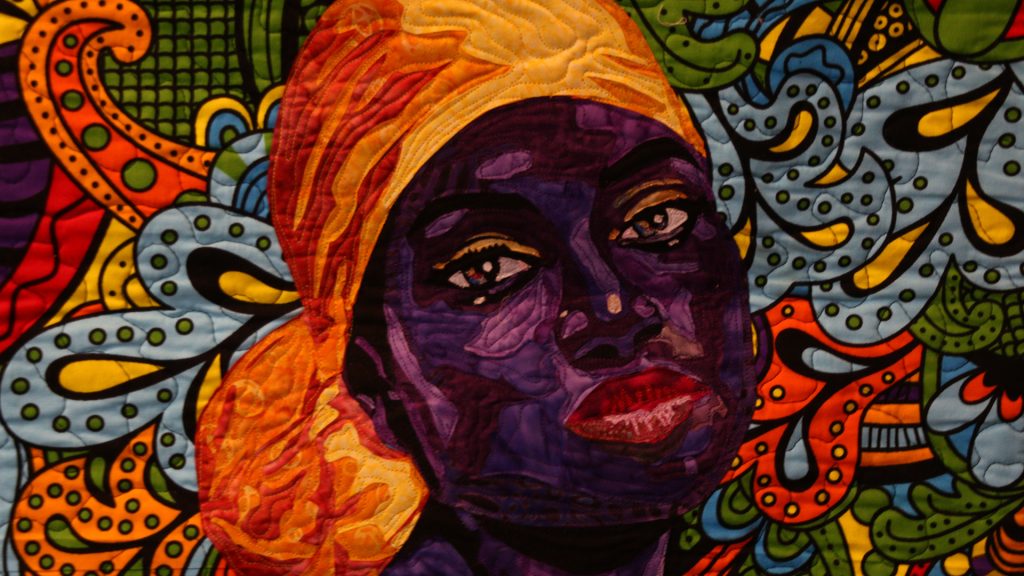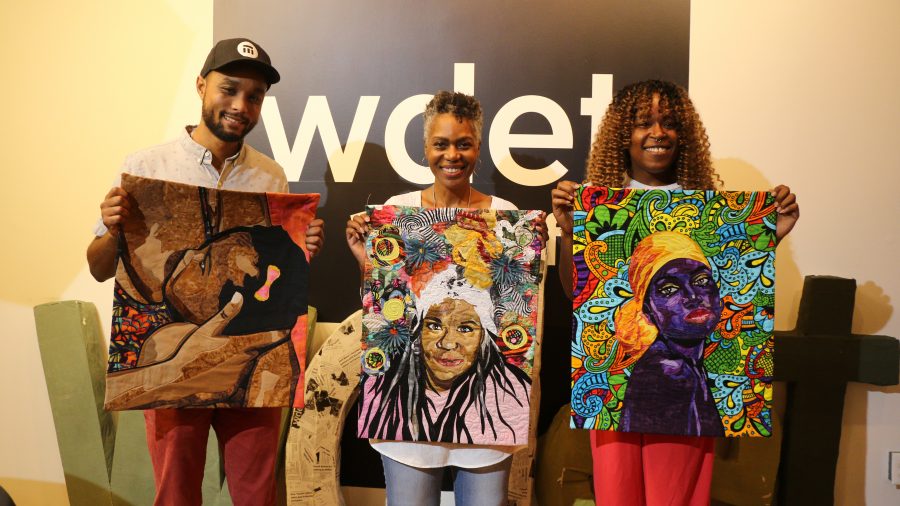The Metro: Ageless creativity and community building in needlework art
Sydney Waelchli August 14, 2024
A photo of a quilt depicting the daughter of fiber artist April Shipp.
It’s fascinating to see that in a world where technology is king, there’s still a strong love for needlework growing throughout metro Detroit and the country.
Maybe it’s because you grew up watching a parent or a grandparent do it, maybe you had a friend that did it, or maybe you just like the community around it, or honestly, maybe it’s nice to just do something with your hands. There are countless reasons why someone may take up a needle-based craft like crocheting, knitting or quilting. But these hobbies have rich histories behind them, whether it’s origins in ancient Egypt or ties to African storytelling traditions.
Subscribe to The Metro on Apple Podcasts, Spotify, NPR.org or wherever you get your podcasts.
To address the rise of the fibrous arts and the history behind them, The Metro was joined by two women in the world of needlework and quilting.
The owner of Parker Avenue Knits in Detroit, Sally Moore, and fiber artist and sculptor, April Shipp, shared their experience and expertise about needlework and quilting.
The fabric arts has been a popular hobby among many including the young, old, male and female. Shipp said she loves fabric and quilting because of the textures, its representation of life and the free feeling she has when crafting.
“First off, the first thing you’re clothed in, the first thing you’re swaddled in, is cloth, right? And when you die, that’s the last thing you wrapped in, is cloth as well. So cloth, to me, is just the feeling of it in my fingers is just amazing,” Shipp said. “I love textiles, and I think we weave so many stories of love and what we do, we tell with my work, I tell stories. I tell narratives, funny and serious, sad and happy. It’s all in the cloth.”
Shipp brought some of her favorite pieces she’s created to the WDET studios, including one where she grabbed scrap fabrics off the floor and threw them together to develop a beautiful collage.

But quilting and knitting aren’t just hobbies — they are a way of storytelling and keeping memories, history and personal legacies alive.
“In the African community, it [needlework] is the story telling. It is the verbal history. Because we weren’t allowed to keep our history. We weren’t allowed to write it down, or we didn’t — we were illiterate — we didn’t know how to write it down, but it didn’t mean that it had to die,” Moore explained. “And in this day and age, with all the noise around us and the short attention spans, having this tool to bring people still and in each other’s presence.”
For African Americans, and many other communities, needlework has passed down many memories and heirlooms through generations. The creativity in the fabric arts is ageless.
At Parker Avenue Knits, Moore created a community of not only African American individuals, but a diverse gathering of anyone and everyone with an interest in fabric arts.
“Many of us [were] strangers before we walked in, but the fiber just levels the playing field and reminds you that we are all part of one big community,” Moore stated.
Her philosophy in creating the shop was to give people a space to have all sorts of conversations, essentially creating a community out of unique characters and turning them all into artists and friends. Needlework, whether someone is creating quilts, clothing, home decor, or whatever their imagination desires, creates a community and spreads love.
Moore provided some advice to people interested in taking up the “sport” when she said, “We figure it out. We commiserate, we rip it out. We do whatever has to be done. But, April made the statement, the only limit is your imagination. So don’t let perfect be the enemy of progress…just keep going.”
More headlines from The Metro for Aug. 14, 2024:
- Mastodons roamed the earth between 23 million and 12,000 years ago. Hundreds of mastodon fossils have been found in Michigan. So many that it became Michigan’s state fossil in 2002. Yes, you heard that right, mastodons are Michigan’s state fossil and could soon become the national fossil thanks to a bill sponsored by Michigan U.S. Sen. Gary Peters. One place you can see our state fossil up close is the University of Michigan’s Museum of Natural History in Ann Arbor. To talk about mastodons, Jake Downey, the docent at the museum, joined The Metro.
